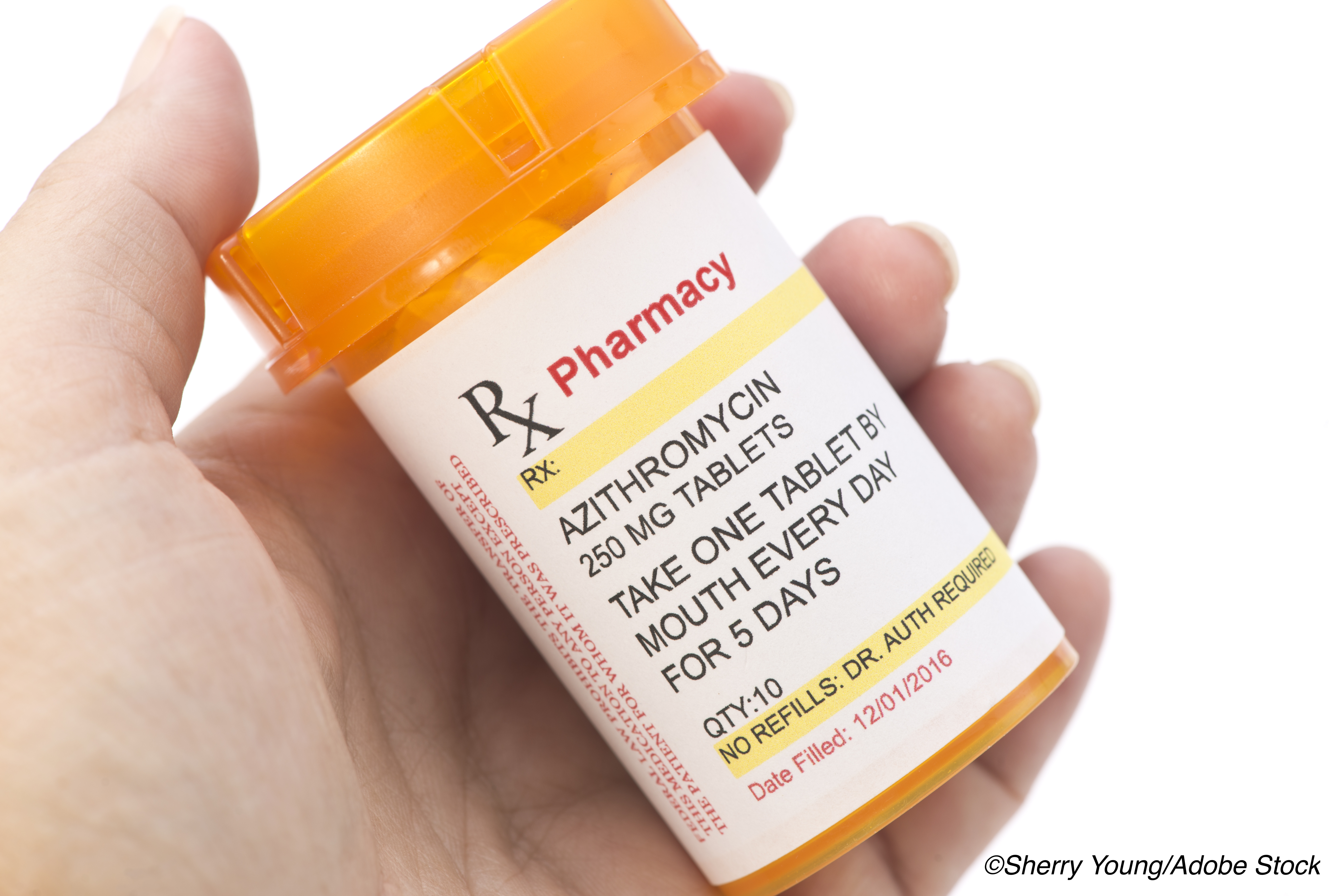Treatment with azithromycin was not associated with improved survival or shorter hospital stays in patients hospitalized with Covid-19 in the RECOVERY Collaborative Group study.
Compared with patients receiving usual care alone, patients treated with the macrolide antibiotic in addition to usual care showed no significant difference in duration of hospital stay or survival at 28 days. And, among patients not on mechanical ventilation at recruitment, RECOVERY researchers observed no between-group differences in the composite endpoint of progression to mechanical ventilation or death.
RECOVERY trial results confirm earlier findings from the COALITION II trial, which also showed no difference in outcomes associated with azithromycin treatment when given with standard care in patients hospitalized with severe Covid-19.
Writing in The Lancet, researcher Peter W. Horby, MD, PhD, of the University of Oxford, Oxford, England, and colleagues from the RECOVERY Collaborative Group wrote that azithromycin use should be restricted to Covid-19 patients with a clear antimicrobial indication within the hospital setting.
“Although our findings do not address the use of macrolides for the treatment of patients with Covid-19 who had not been admitted to hospital with early, mild disease, the results do show that azithromycin is not an effective treatment for patients admitted to hospital with Covid-19,” they wrote.
The RECOVERY collaborative is made up of 176 hospitals throughout the United Kingdom that conduct randomized, open-label trials of various therapies for the treatment of patients hospitalized with Covid-19, including dexamethasone, hydroxychloroquine, lopinavir-ritonavir, and azithromycin.
In an editorial published with the latest findings, clinical trialist Otavio Berwanger, MD, PhD, of Hospital Israelita Albert Einstein, San Paulo, Brazil, wrote that collaboratives such as RECOVERY in the U.K., COALITION in Brazil, and the global SOLIDARITY network offer proof “that pragmatic, randomized clinical trials can be promptly initiated in different countries and settings during a pandemic.”
He added: “Ongoing randomized clinical trials from these collaborative research efforts and from other groups are testing other potential therapies for Covid-19 such as anticoagulant, newer antivirals, anti-inflammatories, and immunomodulatory agents.”
These findings will inform treatment decisions, according to Berwanger.
“The experience and knowledge gained from successfully launching these studies in a matter of weeks has important implications for research not only in Covid-19 but also for future pandemics and for common diseases.”
Berwanger further noted that advances in technology and linkage with electronic health records, mobile applications, and wearable devices can lead to innovations in randomiaed clinical trials, “making them larger, more efficient, and easier to implement.”
In the RECOVERY trial, eligible patients hospitalized with Covid-19 at 176 hospitals across the U.K. were randomly allocated to usual care or usual care plus azithromycin 500 mg once per day by mouth or intravenously for 10 days or until discharge.
Patients were assigned via web-based simple randomization with allocation concealment on a 2:1 (usual care, usual care plus azithromycin) ratio. Neither participants nor local study staff were masked to the treatment, but all others involved in the trial were not aware of the treatment allocation.
A total of 7,763 patients (mean age: 65.3 years; 38% women) were included in the azithromycin arm of the RECOVERY trial, including 5,181 allocated to usual care alone and 2,582 randomized to usual care plus azithromycin.
Among the main trial findings:
- Overall, an equal number of patients allocated to azithromycin and usual care died within 28 days (22% for both; rate ratio: 0.97, 95% CI 0.87–1.07; P=0.50).
- No significant between-group differences were seen in either duration of hospital stay (median: 10 days vs 11 days, respectively) or the proportion of patients discharged from hospital alive within 28 days (rate ratio: 1.04, 95% CI 0.98–1.10; P=0.19).
- Among patients not on invasive mechanical ventilation at baseline, researchers found no significant between-group differences in the proportion meeting the composite endpoint of invasive mechanical ventilation or death (risk ratio: 0.95, 95% CI 0.87–1.03; P=0.24).
- The results were consistent across prespecified subgroups of age, sex, ethnicity, duration of symptoms before randomization, or use of corticosteroids at randomization.
Horby et al noted that azithromycin was proposed as a treatment for Covid-19 based on its immunomodulatory activity.
“Although no major organization or professional society has recommended the routine use of azithromycin in Covid-19 unless there is evidence of bacterial superinfection, it has nevertheless been used widely in patients with Covid-19, particularly in combination with hydroxychloroquine,” they wrote.
While there was no evidence in the study of patient harm associated with azithromycin use, these researchers noted that widespread use antimicrobial agents involve potential societal harm. Azithromycin is classified by the World Health Organization as an antibiotic with a high resistance potential.
“In light of the new evidence from the RECOVERY trial, the widespread use of macrolides in particular and antibiotics in general in patients with Covid-19 should be questioned,” they concluded.
Study limitations include the lack of detailed information on laboratory markers of viral load, inflammatory status, immune response, coexisting bacterial infection, and the use of non-macrolide antibiotics; lack of data on radiologic or physiologic outcomes; and the open-label design of the trial.
- Treatment with azithromycin was not associated with improved survival or shorter hospital stays in patients hospitalized with Covid-19.
- Among patients not on mechanical ventilation at recruitment, no difference was seen between patients treated with azithromycin and those treated with usual care in the composite endpoint of progression to mechanical ventilation or death.
Salynn Boyles, Contributing Writer, BreakingMED™
Funding for the RECOVERY trial was provided by the U.K. Medical Research Council and the National Institute of Health Research.
The researchers reported no conflicts of interest or financial relationships relevant to the study.
Berwanger is a member of the COALITION Covid-19 Brazil executive committee and has received grants from Pfizer and EMS Pharma related to Covid-19 research, as well as grants not related to Covid-19 from AstraZeneca, Servier, Amgen, Bayer, Boeringer-Ingelheim, Bristol Myers Squibb, and Novartis.
Cat ID: 190
Topic ID: 79,190,254,930,730,933,190,926,192,927,151,928,925,934



